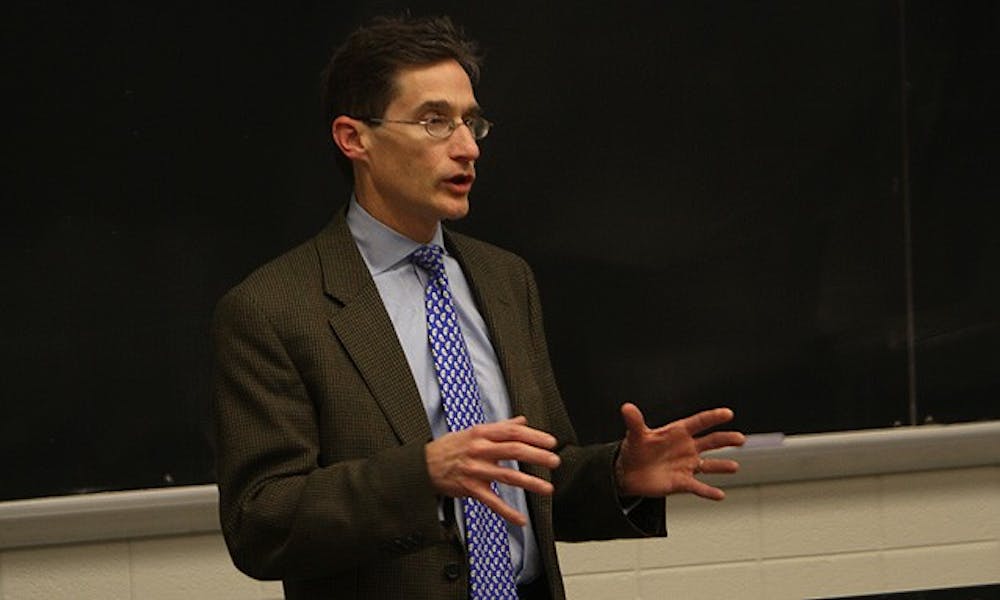The United States needs to adopt an integrated water policy in order to confront the long-term water crisis, a leader in water sustainability said Monday.
Ben Grumbles, president of the Clean Water America Alliance, discussed how American society should change the way it values and manages water at both regional and national levels at a lecture titled “Are We Ready for a National Water Policy?” The event was hosted by the Nicholas Institute for Environmental Policy Solutions.
Grumbles said even though the solutions to water problems depend on specific physical conditions of each region, such as climate and soil quality, the framework of water policy should transcend geographical boundaries and integrate cross-regional collaboration.
“People tend to believe water is local—actually it is, except when it is not,” Grumbles said. “It is the battle we are fighting for all across the country.”
Bill Holman, the director of state policy at the Nicholas Institute for Environmental Policy Solutions, introduced Grumbles as one of the leading thinkers working on water policy, given Grumbles’ diverse experience and involvement in water-related issues.
“The issues he addresses are exactly part of mission of the Nicholas Institute,” Holman said, adding that Grumbles’ perspective may facilitate rigorous conversation among scholars.
In addition to working on local environmental issues, Grumbles promoted an integrative approach to solve large-scale water problems.
Grumbles said the American people had to forgo the traditional way of dealing with water crises because during recent years, new factors such as aging water infrastructure, a growing population and diminishing natural resources have emerged to make the issue more pressing.
“If the U.S. does not make smart changes, our economy will be disadvantaged globally,” he said.
Grumbles added that the government, science agencies, nonprofit organizations and private enterprises all share the responsibility in establishing a national policy framework.
“Every organization is part of the game,” Grumbles said. “We have to push both regional agencies and national entities toward a holistic approach.”
A holistic approach requires people to adopt a new way of interpreting the concept of policy, he said.
“We do not continue to understand ‘policy’ as ‘legally enforceable regulation,’” Grumbles said. “Our organization has been thinking ‘policy’ as a broad concept—a vision and principle of sustainability that needs national attention and support.”
Establishing a holistic national water policy will take time, Grumbles noted.
“[Among all the environmental issues,] there is nothing more conservative than water policy,” he said, adding that skepticism about the severity of water crisis has worsened the situation.
Grumbles challenged the traditional way of dividing a water problem into different subproblems, arguing instead that agencies should learn to view the problem as a whole.
“Some people are still used to separating water problem into water quantity, water quality, water resources and so on, according to different skill sets required and cultural and political concerns in different regions,” Grumbles said. “But now we need an encompassing approach that integrates various considerations.”
Previous policies involved combining science, technology and finance.
“The [United States] needs to embrace some new ways of thinking when it comes to technology and finance,” Grumbles said, noting that technological and financial innovation combined with private enterprise could make a significant difference.
A partnership between public and private sectors is crucial, said Lauren Traugott-Campbell, research fellow at the Center for the Study of Natural Hazards and Disasters at the University of North Carolina at Chapel Hill.
“It’s important to educate people to see the importance of the issue,” Traugott-Campbell said.
Troy Pepping, a first-year student in the Master of Environmental Management program at the Nicholas School, said people should take a proactive attitude immediately to shape a new framework of water policy.
“Even though the [process of raising people’s awareness] is slow, I still have faith that the new mode of confronting the water crisis would be implemented in the long run,” Pepping said.
Before becoming president of the Clean Water America Alliance, a nonprofit organization dedicated to promoting water and environmental policy, Grumbles served as director of Arizona’s Department of Environmental Quality.
Get The Chronicle straight to your inbox
Signup for our weekly newsletter. Cancel at any time.

